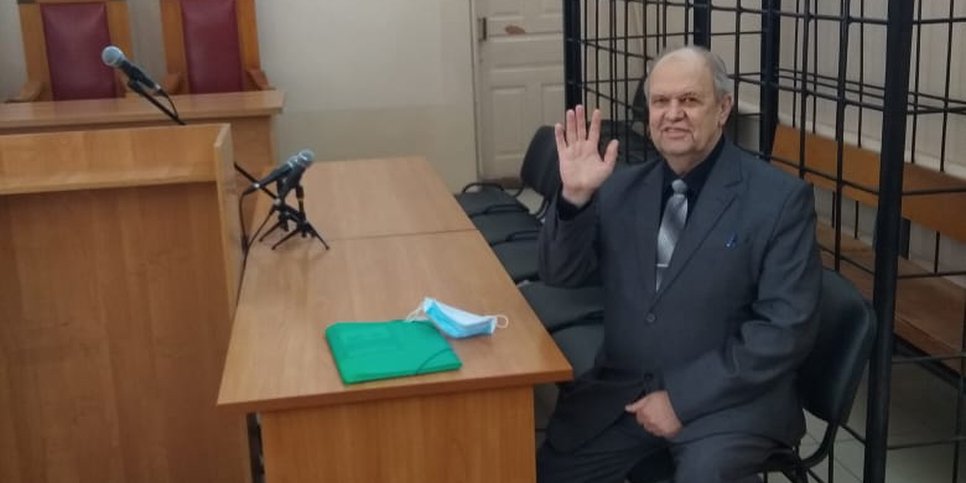In the photo: Aleksandr Ivshin shortly before the sentencing
In the photo: Aleksandr Ivshin shortly before the sentencing
An unprecedentedly harsh sentence for a 63-year-old witness from the village of Kholmskaya: a seven-and-a-half year imprisonment for practicing faith
Krasnodar TerritoryOn February 10, 2021, Aleksandr Kholoshin, judge of the Abinsk district court of Krasnodar region, pronounced the sentence on Aleksandr Ivshin, who was accused by local law enforcement officials of organizing the activities of a banned organization (part 1 of article 282.2 of the RF Criminal Code). The believer was taken into custody in the courtroom. He will be kept in pre-trial detention until the sentence is enforced.
The investigation claimed that an elderly believer had been discussing the Bible with friends from a neighboring town by video link. The state prosecutor asked for 8 years in a penal colony.
There are no victims in the case. Aleksandr Ivshin insists on his complete innocence and will appeal.
The imposed punishment is the harshest of all sentences imposed on Jehovah's Witnesses. Earlier, the court of the first instance sentenced Gennady Shpakovsky of Pskov to 6.5 years in prison, but that sentence was commuted on appeal. The most severe sentences were given to Sergey Klimov, Sergey Filatov, Dennis Christensen, and Artyom Gerasimov. All of them were sentenced to six years in prison. They are currently serving their sentences.
"Today's sentence is shockingly cruel," says Yaroslav Sivulskiy of the European Association of Jehovah's Witnesses, "The news of such a cruel sentence for Aleksandr Ivshin came at the same time as the news from Moscow, where about 15 families of our co-religionists were invaded today by security forces armed with automatic weapons. Television shows innocent, law-abiding people being led with handcuffs behind their backs. No one can explain why they are a danger to the state. The Russian Supreme Court has officially clarified that the decision to liquidate Jehovah's Witnesses' legal entities did not include a ban on religion. Nevertheless, believers continue to be persecuted. In less than four years, 226 people have already passed through the torture chambers or are still there. In recent months, about 50 people at a time are in prison, dozens under house arrest. People are sentenced to 6-7 years in a penal colony, as in Soviet times, and many sentences are already in effect. Legal scholars, human rights activists, and even President Putin are publicly bewildered, but it is still happening. At the end of January 2021, it became known that the president gave a second instruction to the Supreme Court of the Russian Federation to investigate why believers are given guilty verdicts. I hope that the law and common sense will prevail and religious persecution of followers of our religion will stop.
This is not the first imprisonment sentence for believers in the Krasnodar region: In December 2020, two Sochi believers were sentenced by the Khostinsky District Court to 1 year and 1 month to 1 year and 10 months in prison. The believers managed to serve their sentences in the pre-trial detention center.
In April 2020, searches were conducted in nine houses of believers, including Aleksandr Ivshin, in Kholmskaya and Pavlovskaya villages of the Krasnodar region. During the searches, both he and his wife suffered a hypertensive crisis. "I feel humiliated," he said. “All the time waiting for something bad to happen." After the search, he was taken to the Krasnodar FSB, where he was charged under Part 1 of Article 282.2 of the Criminal Code. On the same day, criminal proceedings were instituted. While the investigation was ongoing, Aleksandr spent nine months under house arrest. In December 2020, the case was sent to court. Judge Holoshin managed to fit into four sessions.
In his last statement to the defendant, Aleksandr thanked his wife, Galina, his children, and grandchildren, as well as his friends, for their support during the difficult times for the family and for coming to court on the days of the trial. "I have the feeling that I am not being tried for extremism, but for simply continuing to practice the peaceful religion of Jehovah's Witnesses," he said. “In my last word, I want to assure you once again that throughout my life I have never shown aggression or hatred toward anyone. I was approached for advice and help, and it pleased me. . . . Dear court, my life position is based on biblical principles, where there is no extremism or violence. In view of the foregoing, I ask that I be fully acquitted and thereby regain my good name."
The entire logic of the prosecution was built on the speculative thesis that belief in God is "an extension of the activities of an extremist organization. As a consequence of this approach, instead of searching for and proving the guilt of the defendants, the prosecutor's office was busy "proving" that they practiced a particular religion, even though no religion is banned in Russia. After "proving" the defendants' confession, which they had never concealed, the investigation suggested that this fact should be automatically interpreted as the activities of a banned legal entity. The absurdity of this logic did not embarrass the court, and it equated peaceful believers with dangerous criminals.
Foreign figures and organizations also unanimously condemn the persecution of Jehovah's Witnesses in Russia. These include the European Union foreign policy service, observers of the Parliamentary Assembly of the Council of Europe, the UN Working Group on Arbitrary Detention, and the Office of the UN High Commissioner for Human Rights. The Russian government has repeatedly stated that decisions of Russian courts to liquidate and ban Jehovah's Witnesses organizations "do not assess the doctrine of Jehovah's Witnesses and do not contain restrictions or bans on the individual practice of the above-mentioned doctrine.
